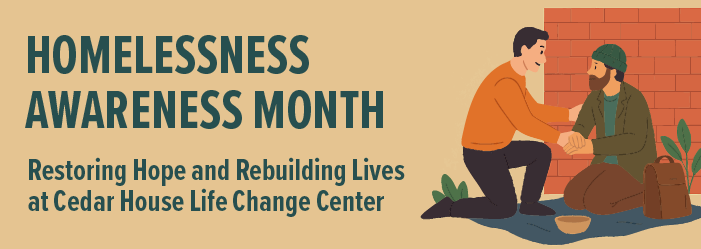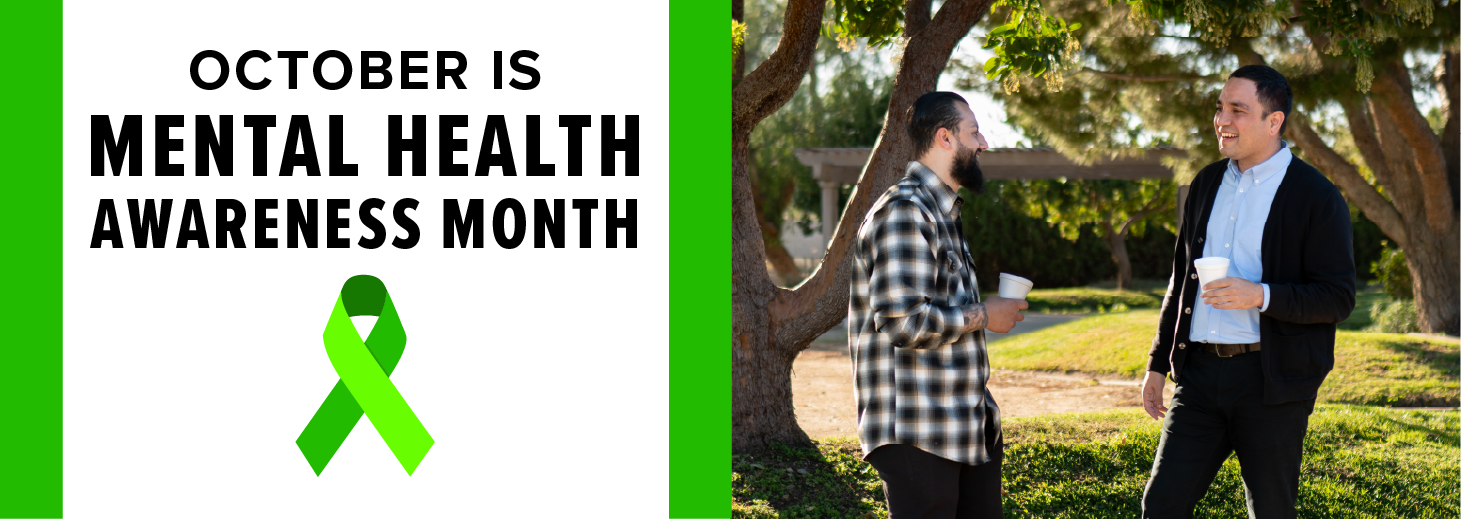Fierce Encouragement

The harsh reality of Zehara’s upbringing came to light when she came to Maple House. She said that her “inner child was crying out for help.” She recalled that, at the age of 11, a classmate noticed bruises from the abuse she was receiving at home. A teacher got involved, and, before she knew it, Zehara and her siblings were taken away from their home. Throughout middle school and high school, she fought with other students and got into trouble frequently. By the age of sixteen, she was pregnant with her first child. She had another child when she turned 21 and moved into a home for single mothers. The second baby’s father asked her to move in with him in Barstow, and so she did. His mother, a drug addict, also lived with them. Even when Zehara and her boyfriend broke up, she still spent time with his mother. One day, Zehara said she was “bored and curious,” and this woman introduced her to meth. "She handed me my first pipe. From that moment, I was hooked."
She started smoking meth every day. Soon after, she got involved with a man who was nearly 50 years old. He was an addict and a dealer. Her addiction escalated, and she went from smoking to needles. She would leave her kids with his mom and spend all her time on the streets with him selling and using drugs.
After she gave birth to her third child, she was able to stay clean for a couple of months. One day, the newborn had a seizure, and they rushed him to the hospital. The doctors found meth in the child’s system, and he was taken into CPS custody. Zehara suspects that his grandmother must have smoked near the baby because she was staying sober at the time. Next, CPS took her other two children, and Zehara started using again.
When they took my kids, I went downhill. She confessed that she used drugs continuously during this time. Even when she had to pass a drug test to continue visitation with her children, she used someone else’s urine to get by. Eventually, she stopped going to get tested altogether. She said, “That’s when the once-a-week visitation turned into once-a-month because I kept messing up.”
When she got pregnant again, she said, “Time was ticking. They were going to adopt my kids out. I was still using drugs, but I’ll be damned if they’ll take my baby.” With that newfound determination, Zehara came to Maple House, but she feared that she had waited too long to get her kids back.
"I had it in my head that they were going to take my baby. So what’s the point of getting help. What am I doing this for?"
The more discouraged she got, the more her case managers would push her to stay focused on her goals. They reminded her that she needed to get sober for herself. She said, “I lost hope, but Maple House kept encouraging me. I learned so much about myself. My inner child was crying out for help, and my inner self got help. I got a lot of things answered about myself. Maple House really pushed me. I didn’t give up.”
After completing 118 days of treatment, Zehara moved into a transitional home for six months. Now, Zehara lives with two of her children in her own apartment in Redlands, and she has reconnected with her family who have been a strong support system for her in recovery. She will receive her high school diploma in two weeks from Redlands Adult School and hopes to one day work at Cedar House.
Zehara reflected on her experience: “I was young, dumb, naïve. I dated a drug dealer for 6 years. I didn’t pay attention to my kids. Maple House gave me a whole different view of life and taught me to keep moving forward.”
"If it wasn’t for Maple House, I wouldn’t be here. I wouldn’t think I was worthy. Maple House changed my life."


The holiday season can be joyful but also challenging. For many people, the holidays are a time of togetherness and celebration. But for those in recovery from substance use, this season can bring a mix of emotions -- joy and gratitude, but also stress, temptation, and pressure. Family gatherings, social events, and memories of past holidays can test even the strongest commitment to sobriety. At Cedar House Life Change Center, we understand these challenges. Our mission is to help individuals and families build lasting recovery through treatment, education, and ongoing support. Here are a few practical ways to protect your sobriety and stay connected to hope this holiday season. 1. Plan Ahead for Triggers Before attending a party or event, think about what might challenge your recovery. Bring your own non-alcoholic drink, drive yourself so you can leave early if needed, and connect with your sponsor or peer network before you go. Preparation gives you confidence and control. 2. Stay Connected to Your Support System The holidays can feel isolating, especially if you’re making lifestyle changes. Reach out to supportive friends, family members, or recovery peers who understand your journey. Schedule a check-in or attend a support group before and after big events. Staying connected helps you stay grounded. 3. Prioritize Self-Care Take care of yourself, physically, emotionally, and spiritually. Maintain regular sleep, eat balanced meals, get outside, and make time for reflection or prayer. A calm and nourished mind is your strongest ally in maintaining sobriety. 4. Set Boundaries and Say “No” Without Guilt You don’t have to attend every event or explain your choices. Declining an invitation or leaving early doesn’t make you antisocial. It makes you strong. Your recovery is your priority, and real friends and loved ones will respect that. 5. Keep Recovery at the Center of the Season Stay consistent with meetings, counseling, or alumni groups. Cedar House offers aftercare support, relapse prevention programs, and peer connections that help clients stay engaged long after treatment. Recovery doesn’t stop after discharge. It’s a lifelong process of growth and renewal. You Don’t Have to Do This Alone If you or someone you love is struggling this holiday season, Cedar House Life Change Center is here to help. Our compassionate team provides evidence-based treatment, medical support, and recovery programs designed to meet each person’s unique needs. Reach out today to learn how we can help you or your loved one find peace, purpose, and sobriety this holiday season and beyond.

November is Homelessness Awareness Month, a time to shed light on one of the most urgent issues facing our communities. Every day, thousands of individuals and families across San Bernardino County struggle with the devastating cycle of homelessness, often intertwined with substance use and mental health challenges. At Cedar House Life Change Center, we believe that recovery and stability begin with compassion, connection, and comprehensive care. For more than five decades, Cedar House has provided a safe haven for those seeking to overcome addiction and rebuild their lives. Many of the people we serve come to us after experiencing homelessness or unstable housing—circumstances that make recovery even more challenging. Through our evidence-based treatment programs, sober housing resources, and continuum of care, we help individuals find the structure, support, and self-worth needed to thrive. Our services address more than substance use. We provide mental health counseling, case management, and referrals to permanent housing, recognizing that recovery is not complete until every person has a safe place to call home. For many, Cedar House becomes the bridge from crisis to stability—where individuals rediscover hope, rebuild family connections, and prepare for lasting independence. This month, we invite our community to join us in raising awareness, reducing stigma, and supporting efforts to end homelessness. Whether through donations, volunteering, or spreading the word, every act of compassion brings us closer to a future where recovery and housing are accessible to all. At Cedar House, we know that healing happens one person—and one home—at a time.

Each October, Mental Health Awareness Month reminds us that recovery and healing are possible for everyone. At Cedar House Life Change Center, we understand that mental health and substance use are deeply connected. Many people who struggle with addiction are also coping with conditions such as anxiety, depression, or trauma—and each affects the other. Treating both together is essential to lasting recovery. For more than 52 years, Cedar House has been helping individuals and families throughout the Inland Empire rebuild their lives through compassionate, evidence-based treatment. Our staff empowers people to overcome addiction and mental health challenges with respect, dignity, and hope. Tips for People Seeking Support If you or someone you love is struggling, here are a few ways to start your journey toward recovery: 1. Reach out for help early. You don’t need to wait for a crisis to ask for help. Early intervention can prevent harm and improve long-term success. 2. Get a professional assessment. At Cedar House, licensed clinicians assess each individual’s physical, mental, and emotional health to create a personalized plan. 3. Find community support. Recovery grows in connection. Peer support, counseling, and family engagement help build resilience and accountability. 4. Create stability. Safe housing, structured routines, and supportive care environments help lay the foundation for recovery. 5. Commit to ongoing care. Recovery doesn’t end after treatment—it continues through outpatient services, counseling, and ongoing connection to support systems. How Cedar House Life Change Center Can Help Cedar House offers a continuum of care designed to meet people wherever they are in their recovery journey: Withdrawal Management and Residential Treatment — Structured programs for men and women addressing both substance use and co-occurring mental health disorders. Maple House Perinatal Program — Family-centered services for mothers and children to recover and thrive together. Outpatient and Aftercare Programs — Continuing care, therapy, and relapse-prevention strategies for lasting stability. Family Support — Counseling and education to strengthen families and rebuild relationships. Our integrated treatment model ensures that every client receives comprehensive, coordinated care. You Are Not Alone This Mental Health Awareness Month, Cedar House encourages everyone to talk openly about mental health and seek support when needed. Recovery is not a solitary journey—it’s a shared path toward healing, strength, and renewal. If you or someone you love is struggling with substance use or co-occurring mental health issues, contact Cedar House Life Change Center today. Together, we can help you find hope, healing, and a fresh start.

Share On: